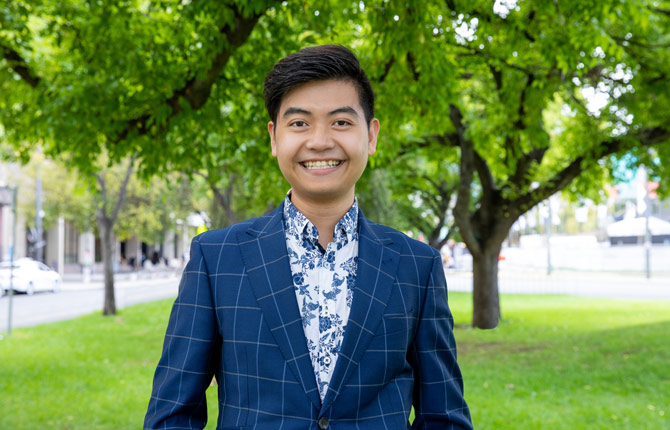
When Wathnak arrived in Adelaide in 2012, his caring and empathetic nature led him to become involved in international student advocacy. Firstly, at Woodville High School, and later during his time studying for his bachelor’s degree at the University of Adelaide.
Through this work, Wathnak developed a keen interest in mental health and wellbeing. Now studying for his master’s degree, Wathnak continues to dedicate time to giving back to the community by volunteering and working with many government and non-government organisations.
Wathnak’s dedication to helping others has earned him several well-deserved awards, including:
- 2015 Order of Australia Student Citizenship Award
- 2015 South Australian Multicultural Youth Award
- 2020 Mental Health Youth of the Year
We spoke with Wathnak to find out what inspired his interest in mental health and how living in Adelaide has helped shape his view of the world.
What led you to study in Adelaide?
I came to Australia in 2012 to study at the Adelaide Secondary School of English (ASSE). I had the option to go to the United States or Australia. I chose Australia because it’s closer to Cambodia and has a good climate. The time difference is also good. Just three or four hours, so it’s easier to keep in touch with people back in Cambodia.
Tell us about your time at Woodville High School.
At first, my dad wanted me to go to a private school. But I wanted to go to my local public high school, Woodville High. I have the privilege of coming to Australia, and I wanted to immerse myself in how the public system works.
I started in Year 10 with another friend from ASSE. On the first day, the homeroom teacher introduced us to everyone. At first, my friend and I would stay together and eat lunch together. But then we got to know new people and classmates from all our different subjects.
The next term, when more students from ASSE started at Woodville, I wanted to help, so I asked if I could become a mentor to help other international students settle into school.
You were heavily involved in student advocacy in your high school years. How did this inspire your interest in mental health work?
In Year 11, I was a leader on the student representative council (SRC). We would hear issues from students and bring them to the school counsellor and the principal. I decided to come to school early and stay late so students could come and talk to me in the library. I believe talking peer-to-peer is more effective because people might not be confident enough to go to a teacher.
Students came to me each day to talk about their struggles and their issues. I wasn’t a qualified counsellor, but I could be a peer support. I would say, ‘Hey, I’m here to listen to you.’ Then I could refer students to the school counsellor or other support services like our local Headspace.
That’s how I got to know about mental health and became extremely passionate about it. When I was school captain in 2015, I led assemblies and talked about mental health in workshops at school.
What led you to study for your bachelor’s degree in international development and social science?
I’m a person who loves studying and reading. I wanted to do well in high school, and I got an ATAR of 97.75. For some time, I had wanted to be a lawyer.
I started my law degree doubled with international studies. But after the first semester, I started questioning if this was for me. I wanted to share my empathy and compassion with other people, and learning a lot about politics didn’t feel like me.
I changed to the Bachelor of International Development and Bachelor of Social Science, and I loved it so much. I learned about issues across the whole world like poverty, the global sustainability development goal and how to run workshops and be a consultant. I was a citizen of the world learning how I could be part of making it a better place.
Describe your time studying at the University of Adelaide.
I really enjoyed my time at the University of Adelaide. I miss my bachelor studies life. When I started, there was no Cambodian club. I asked the Adelaide University Union if I could create one, and they said yes. It’s not just for Cambodian students; all are welcome. We held workshops, had lunch together, ran homework and study clubs and made lots of friendships. My girlfriend is Cambodian, and we met through the Cambodian Club.
You’re the youngest Cambodian Justice of the Peace (JP) in Adelaide. Why did you decide to become a JP?
I wanted to help the Cambodian community. There aren’t many JPs who speak Khmer, and many Cambodian people need help with certifying documents and translating information. If they can’t find a Khmer-speaking JP, they have to pay for an interpreter. I did my exam and became a JP to help the community via the Cambodian Association of South Australia. I can help reduce stress for people and refer them to the services they need.
You’re continuing your study journey with a master’s degree in counselling and psychotherapy. How has your work experience helped your studies?
I work for Relationships Australia as a counsellor and case manager, which helps me translate my studies into the real world. In the counselling and mental health field, it’s not just about the textbook. Of course, the textbook is important to give you the foundation and the concepts, but you need to go out into the real world to practice and get that experience in the field.
Your master’s degree is based in Queensland, but you’re staying here while you study. Why did you decide to stay in Adelaide?
I have my dad here and my friends. I just bought a house, so I want to stay here in Adelaide and have my family here. I’ve been to Brisbane, Sydney and Melbourne, and the lifestyle there is just not me. I like the easy life here and how I can quickly pop to the Central Market. In other states, you have to travel a lot.
I love the beach and the ocean. I can go to Henley Beach, Grange or Semaphore and catch crabs by dropping nets off the jetty. Back home, I have to drive for hours to get fresh seafood.
What advice would you give to students considering studying in Adelaide?
Go for it! In Adelaide, there are so many opportunities, not just for study. My advice is to make your life more than only university. For me, without volunteering, I wouldn’t have known mental health is my passion. Study is the number one priority, but enjoy yourself and learn more about Adelaide and develop your networks. That’s how I got my first job here.
View all Stories


